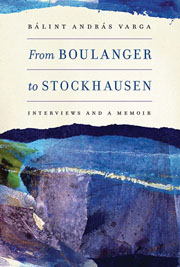Book contents
- Frontmatter
- Dedication
- Contents
- Foreword
- Acknowledgments
- Part One Interviews
- Preface to the Interviews
- Composers
- Conductors
- Instrumentalists
- Singers and a Record Producer
- Cathy Berberian
- Elisabeth Schwarzkopf and Walter Legge
- A Teacher
- Music Administrators
- Snippets
- Part Two A Memoir
- Notes in Retrospect
- Index
- Miscellaneous Endmatter
Elisabeth Schwarzkopf and Walter Legge
from Singers and a Record Producer
Published online by Cambridge University Press: 05 January 2014
- Frontmatter
- Dedication
- Contents
- Foreword
- Acknowledgments
- Part One Interviews
- Preface to the Interviews
- Composers
- Conductors
- Instrumentalists
- Singers and a Record Producer
- Cathy Berberian
- Elisabeth Schwarzkopf and Walter Legge
- A Teacher
- Music Administrators
- Snippets
- Part Two A Memoir
- Notes in Retrospect
- Index
- Miscellaneous Endmatter
Summary
[Bálint András Varga (BAV):] Could I end with a more general question. In the third movement of Sinfonia, the first tenor cries out that music cannot stop war, cannot make the old younger, nor lower the price of bread. You refer to the same theme in one of your articles. I assume you mean by this that music has no practical use. Yet at the same time you are very much aware of the composer's responsibilities. Isn't there a contradiction here? After all, what is music for? You asked that question yourself in an episode of C'è musica e musica.
[Luciano Berio (LB):] Yes, but there is no answer. If we knew it, we would stop writing music. If we could give a logical, practical, rational answer, music would be like functional speech where “signifier” and “signified” are ready-made.
[BAV:] But I think there is an answer. I remember attending two of Elisabeth Schwarzkopf's Lieder recitals. On both occasions I felt as if the blood was circulating faster in my veins and for days afterward I felt a different person. I understood then that it was no empty phrase that music can make you better. And if music has that power, it does possess an important function.
[LB:] Well, maybe that shows that you are a sensitive person and that you are not indifferent to some of the emotions of music. But I don't believe that music can make anybody better.
- Type
- Chapter
- Information
- From Boulanger to StockhausenInterviews and a Memoir, pp. 167 - 184Publisher: Boydell & BrewerPrint publication year: 2013



